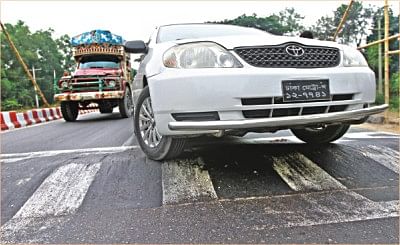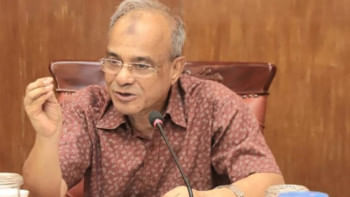Speed breakers the accident makers

A car goes over a speed breaker in an angle so that it does not scrape its bottom on the high bump. A large number of the speed breakers in the country are too high for small vehicles to scale over comfortably even at crawling speed. The photo was taken near Jahangirnagar University on Dhaka-Paturia Highway. Photo: Sk Enamul Haq
Roadside residents and shopkeepers are building unauthorised speed breakers in their attempts to curb reckless driving, but the practice is exposing motorists to danger and increasing travel time.
In a 40-kilometre stretch of road between Dhaka and Mawa, 41 speed bumps were built in the last two years.
Most of those bumps, made by local masons and laymen, are on national highways without any marker or warning sign, posing a threat to motorists who are unaware of their existence.
Some are so incompetently built that those are too high for small vehicles. But the increasing number of deaths and injuries on roads suggests that the number of speed breakers may well keep rising.
Roads and Highways Department (RHD) officials confirmed that it is illegal to build bumps on highways unless authorised traffic engineers are convinced about their importance. But they also expressed their helplessness in the face of pressure from locals and their elected representatives, who constantly demand the speed bumps.
RHD engineers and the chairman of the parliamentary standing committee on ministry of communications say the trend is a direct consequence of anarchy on roads, where reckless driving reigns.
Throughout the country, motorists, especially truck and bus drivers, nonchalantly defy all driving rules and speed limits, overtaking other vehicles at bazars, intersections, schools, and hospitals without the slightest regard for life and property.
Police patrolling the highways are mainly concerned about escorting VIPs through their jurisdiction. These law enforcers have little care for curbing reckless driving until accidents happen in their areas.
Every time there is an accident involving pedestrians or slow-moving vehicles on highways, locals blockade the road and demand speed breakers.
At times, villagers rough up RHD officials for the latter's move to remove illegal bumps from highways.
Thousands of speed breakers -- illegal and authorised -- now dot the 20,735km of national highways. Those slow traffic, increase fuel consumption, and encourage setting up of roadside shops.
Amid chaos in the transport sector and increasing number of deaths and injuries on roads, 78,495km of classified rural roads are also getting speed breakers. According to an RHD web information, around every 1.9 km of road network in the country, the density of population stands at 1,000. Human activities on roads are therefore inevitable.
Sheikh Mujibur Rahman, chairman of the parliamentary standing committee on communications ministry, told The Daily Star recently that the practice of putting up unauthorised speed breakers on national highways must stop.
He said reckless driving is the main cause of such initiatives by the people living along highways.
"Bulk of the professional drivers migrated to other countries, leaving a vacuum in the sector which is being filled up by amateurs," Rahman, also a lawmaker from Satkhira-1 constituency, said.
"When I go to Satkhira from Dhaka, I have to cross 151 speed breakers, wasting a lot of time and energy," he said.
Rahman added that the process of issuing driver's license, and policing on highways must be upgraded to tackle the situation.
Arifin Rahman, RHD superintendent engineer of Dhaka Circle, said there is no provision for speed breakers on inter-district highways.
"Speed breakers are not a remedy. We need to discipline the sector with awareness raising campaigns, and enforcement of laws."
"This trend defies all rules of road communications, and it is a blatant outcome of callousness and chaos gripping our road transport system," Rahman added.
"Throughout the country there is a tendency to build shops and bazars by highways. For development of the country, we need to have proper highways with proper signs, and a special force to intercept law-breakers and hand out punishment," said the official.
The problem is aggravated by vehicle operators. Most drivers joining the booming road-transport sector come from rural backgrounds; literacy, even the ability to write their own name, is rare.
They learn to drive from unqualified driving instructors offering cheap lessons, and assuring them of licences. And those ill trained drivers soon start driving on roads.

 For all latest news, follow The Daily Star's Google News channel.
For all latest news, follow The Daily Star's Google News channel. 



Comments